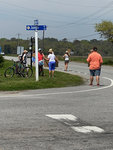
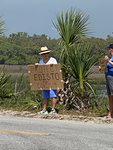
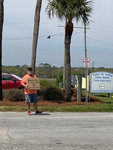
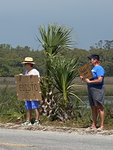
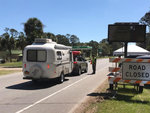
Edisto Beach residents had an eventful time last week, complete with protesters.
Mayor Jane Darby and the Town Council voted on Sunday March 29 to reinstate a local state of emergency, passed Wednesday March 25 for the Town of Edisto Beach for 60 days, closing the beach to the public. The Sunday vote hopefully will conclude what became a seesaw of confusion over the last few days over who had the authority to do what — complete with protesters.
The Original Proposal
The town’s state of emergency passed on March 25 closed the beach to everyone except town and island residents. Barricades on the roads were installed and short-term rentals canceled.
The council hoped to lessen the intensity and duration of the crisis, reduce the stress of the first responders and health care system, and prevent unnecessary deaths by issuing regulations regarding businesses and tourism.
Then on Friday
But after Darby and the town council issued their first emergency ordinance on March 25, they received a March 27 response from Solicitor General Robert Cook in a letter to the Hon. Jeff Bradley, District House representative, that basically said only the governor could close a municipality.
The four-page letter said, in part, “Each provision [of Home Rule] makes clear that the grant of power is subject to the general law of the state ... The empowering of any government or officials with the authority to order and compel an evacuation, thereby forcibly separating its citizens from their homes, businesses, property and even families is clearly at odds with the fundamental rights, freedoms and privileges which are the bedrock of our nation ... This conclusion that the governor’s emergency powers preempt those of counties and municipalities is equally affirmed and is provided as guidance to counties and municipalities.”
So, Edisto and Folly Beach (which had also closed with a similar ordinance) both rescinded Wednesday’s ordinance, opening the beach back up on Saturday. Columbia and Charleston, which have both state-at-home ordinances in place, ignored the letter.
Mayor Darby and the council decided to reopen the beaches because of that information. But on Saturday, a huge influx of people came to the beach, swelling the population to a significant number in a short time.
Some rental homes had 10 cars parked at one residence. The local grocery store was packed with visitors, and residents were fearful to leave their homes to go into the community. A game of touch football involving dozens of teens was being conducted, in spite of the social distancing mandates, and the beach crowd was continuing to grow.
“People who want to flee from their virus hotspot states or who own homes here and live in other states want to come here to vacation at the beach, but we can’t take the chance that they aren’t bringing the virus with them,” said Darby. In 2010, the average age of Edisto Beach residents was 65. That was 10 years ago, and the people have aged since then.
And on Saturday
Then on Saturday, S.C. Attorney General Alan Wilson stated that although the towns had the power to initiate and enforce the ordinance, the governor’s mandates preempt any local ordinances.
Robert Kettle, spokesman for the Attorney General’s office, said, “We do not make the laws, we just follow them. We do not want to take control away from the local governments, but we do want to let them know what the law says. If Edisto wants to continue to keep the beaches closed, they have that right; however, we wanted them to know that since the governor has not issued the same mandate, then the town of Edisto Beach is liable for any lawsuits that may arise from that decision.”
The protestors
Residents of the beach, fearful of the spread of the virus, took to the streets with signs protesting against visitors coming to the town.
“Picketers were some of our younger people who own businesses. They are hurting financially, but they wanted to cooperate to protect people of the island. The young people’s hearts were in the right place; don’t blame them. We all love our community, and the citizens’ protests were peaceful. The signs were not bad, but respectful. Most of the protestors indicated that visitors were welcome after this pandemic is over. Please stay away until then,” said Darby.
On Sunday
Concerned that the potential for conflict between residents and visitors was a possibility, the Town Council met again Sunday and discussed the situation.
“You are never going to please everyone,” said Darby. “We understand that people are disappointed that there are no vacation rentals. We know that this is spring break time and we hate canceling reservations, but we have tried to do this in a timely manner so that people can know ahead of time and make plans.
“Right now, Charleston has the fastest growing virus rate in the state. Many of those people like to come to our beach, and visitors who are staying here enjoy traveling to Charleston. That increases the risk for residents here,” Darby said.
So Sunday afternoon, the decision was made by council to once again close the beaches to visitors.
Council cited the following reasons:
The town does not have the manpower to control traffic.
The governor stated that no more than three people may be together in a group, and beach visitation makes that too difficult to control with limited manpower.
The governor’s executive order “authorizes any and all law enforcement officers of the state, or any political subdivision thereof, to do whatever may be deemed necessary to maintain peace and good order during the State of Emergency and to enforce the provisions of any order.” Closing the beaches will ensure there is no conflict between residents and visitors.
Visitors from states where the virus has had substantial community spread have to be quarantined for 14 days. Town authorities have no ability to assess whether visitors were previously quarantined.
The re-opening of the town has caused serious impediment to the town’s ability to enforce the executive orders of the governor, to maintain peace, to prevent the spread of the virus and to provide services to the residents.